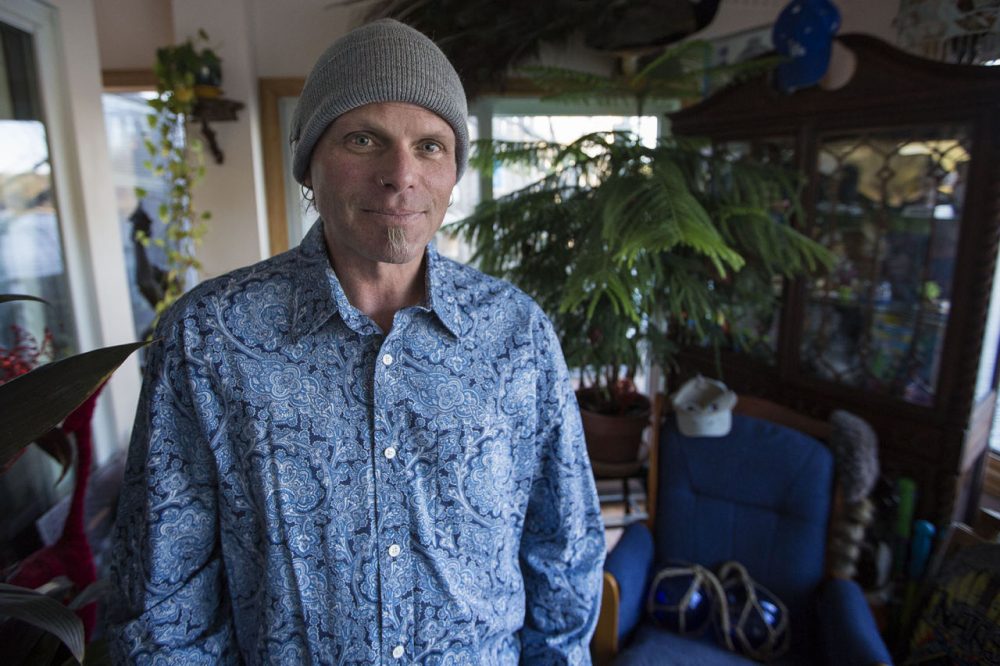Advertisement
'Not Unlike A Mortgage': Health Care Loans Proposed For Pricey Treatments

About three years ago, right around his 50th birthday, Robert Deckman found out he qualified for MassHealth. So this carpenter from Gloucester did something he hadn’t done in years: He went to the doctor.
"I’m like, well, let’s get the 50-year tuneup, the whole nine yards, just everything," Deckman said recently, tossing his hands in the air. "The blood work was the last thing I did."
The blood work showed Deckman had hepatitis C, a virus that damages the liver. His doctor delivered good news: A drug coming on the market would almost certainly cure his disease. And bad news: One bottle of the pills would cost $37,000. Deckman would probably need two.
"'I can’t pay that, so I guess I’ll just die,' " Deckman recalled telling the doctor.
The doctor told Deckman insurance should cover Harvoni, the medicine the physician would prescribe, but his insurance provider might make him "jump through hoops," the doctor said.
Deckman was denied the very expensive life-saving drug twice. His skin turned yellow, his pony tail thinned, he developed a skin infection and problems with his teeth. Deckman’s family grew desperate. His sister, Viki Deckman-Moeller, laid out a strategy.
"Plan A was to put a fundraiser together for my brother, and see if we could, just through friends and family, get some donations," Deckman-Moeller said. "And then, we were looking at, or I was looking at, going out and getting a loan of some type at a low interest rate, for -- it would have been about $50,000 I guess."
Taking out a loan or pulling out a credit card to pay a health bill is not new. But now, with hep C pills that are $1,000 apiece, cancer drugs priced at $100,000 a year, and gene therapy at almost $1 million per treatment, credit cards or a line of credit at your bank will not be adequate.

MIT professor Andrew Lo and Dr. David Weinstock at the Dana-Farber Cancer Institute say it’s time to create a long-term health care loan.
"The basic idea is for individual patients to have access to health care loans, not unlike a mortgage or auto loan or student loan," Lo said. Patients would "borrow from a loan company to pay for these extremely expensive therapies and amortize the payments over a period of time, say five to 10 years."
The loans would be available for drugs or treatment that would cure a disease or improve a patient’s health over the length of the loan.
"If the drug works, then all the payments would be made, but if it doesn't, then payment would stop," Weinstock said. "That creates more risk in the investment itself but it also incentivizes drug companies to develop drugs that really do work."
The loans would not apply to drugs that prolong life for just a few months.
Patient loans are the first part of the Lo-Weinstock plan. Their longer-term payment model for exceptionally high cost medicine is a loan insurers would take out for individual patients. The loans would move with the patient when he or she changes health plans. Lo and Weinstock acknowledge that requiring insurers to accept existing patient loans, as they do a patient's preexisting condition, would require amendments to state or federal laws or regulations.
Advertisement
Some consumer advocates question the need for such loans, arguing that patients have health insurance for just this reason -- to cover costs patients can't manage on their own. Some insurers have warned that they can't absorb rising pharmaceutical costs indefinitely. Weinstock and Lo say insurers may be more willing to borrow money for very expensive treatments than pay one lump sum upfront.
"For two reasons: One is that they spread the payment out, and the second is that they stop paying if the drug stops working," Weinstock said.
And Weinstock says the loans would be a boost for drug developers who target rare diseases because payment for discoveries that work would be assured.
Lo and Weinstock are organizing a conference later this year with investors, insurers, pharmaceutical reps and others to plan their next steps.
Some mortgage experts urge the two men to focus on loans to insurers and forget the idea of patient loans.
"Loans [to pay off medical debt] have been the single biggest driver of consumer bankruptcies to date," said Patricia McCoy, a law school professor at Boston College who helped set up the federal Consumer Financial Protection Bureau.
McCoy says she worries that, as in the housing mortgage crisis, patients would sign for loans they could not pay back. "So we're setting them up for possible medical and financial failure. That’s something I would hate to put desperate patients in danger of," McCoy said.
At Health Law Advocates, a Boston-based agency that helped Deckman, the carpenter from Gloucester, answer some questions, director Matt Selig said: "It's very scary to think you'd have to mortgage your future to pay for health care that would either maintain the quality of your life or save your life. In our society, that really shouldn't be the case."
What would happen, Selig asked, if someone defaulted on a loan? Lo and Weinstock use student loan default rates to predict how often patients might not repay health care loans. They conclude that even with a significant default rate, health care loans would still be attractive to investors.
Lo says the loans would have to be used and managed carefully. He and Weinstock say they are disturbed by the idea of patients going into debt to buy treatment that may save their lives. But Lo says they shouldn’t be dying because they can’t afford a drug either.
"So, rather than just watching it happen, we feel that a better way is to provide these health care loans and over time," Lo said, "I’m hoping that policymakers will see the urgency of dealing with these issues and be able to provide the right kind of legislation so that insurance companies can cover this and still stay afloat."
Deckman's Health
On the third appeal, Deckman's insurance plan agreed to pay for two rounds, or two bottles, of Harvoni. He finished the treatment and Deckman’s doctor told him he’s almost certainly cured. He will not need a third bottle of Harvoni, which would have brought the cost of his treatment to more than $100,000. Feeling great for the first time in years, Deckman is grateful — and frustrated.
"How do you justify [$100,000] plus tax for 90 pills to save someone’s life?" Deckman asked. "I mean, come on."
Gilead, the company that makes Harvoni and Sovaldi, has said that its hep C drugs are a good value because they save the costs of treating liver disease or liver transplant surgery.
Massachusetts Attorney General Maura Healey is in discussions with Gilead about whether the company's pricing strategy is unfair and deceptive, in violation of state law.
